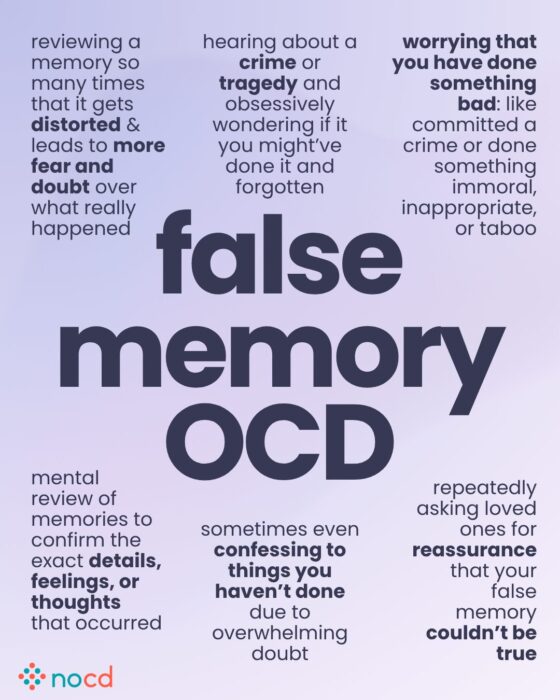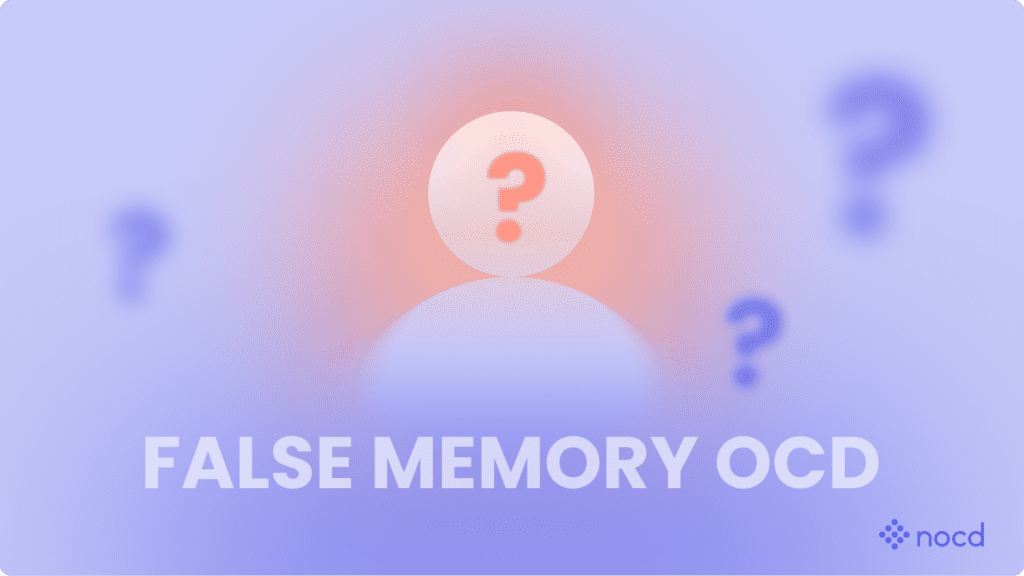False memory OCD is a subtype of obsessive-compulsive disorder (OCD) where people experience intrusive doubt about whether past events really occurred. Unlike ordinary forgetfulness, this OCD subtype causes persistent anxiety, intrusive thoughts, and compulsive checking about memories that may have never happened. Research shows that more than 30% of people report experiencing symptoms of false memory OCD.
What causes false memory OCD?
There’s no single cause of false memory OCD. OCD can develop from a combination of genetic, biological, and environmental factors, such as:
- A family history of OCD.
- Brain structure and neurotransmitter differences.
- Stressful or traumatic events—such as abuse, illness, loss of a loved one, or significant life transitions.
- Specific cognitive patterns (e.g., perfectionism, thought-action fusion, obsessive doubt).
False memory OCD examples
People with OCD can experience two types of symptoms: obsessions and compulsions. In the context of false memory OCD, the obsessions—or unwanted and intrusive thoughts, sensations, images, feelings, or urges—are related to memories of past experiences. Doubt about what may or may not have happened usually feels so intense that people engage in repetitive physical or mental compulsions to relieve distress.
To better understand false memory OCD, here are some examples of common obsessions and compulsions:
Common obsessions of false memory OCD
Common obsessions in false memory OCD include:
- Worrying that you said something inappropriate to your friend.
- Doubting whether you harmed someone while driving, even though you remember arriving home safely.
- Believing you cheated on your partner after a night out, even though there’s no evidence.
- Feeling you might have committed a crime or made a serious mistake in the past.
Common compulsions of false memory OCD
And here are a few examples of false memory OCD compulsions:
- Mentally replaying events repeatedly.
- Seeking reassurance from others.
- Writing or journaling to “prove” memories.
- Avoiding situations that may trigger past-event doubts.
Is it false memory OCD or denial?
It can be difficult to tell whether intrusive doubts about past events are caused by OCD or by normal guilt or denial. The key difference is that false memory OCD is anxiety-driven and repetitive, whereas denial is a conscious avoidance of distressing memories or emotions.
Here’s a breakdown of the differences between false memory OCD and denial:
| Feature | False memory OCD | Denial / normal guilt |
| Mental review of events | Recurring, intrusive | Rare or occasional |
| Anxiety level | High, persistent | Moderate, situational |
| Reassurance-seeking | Frequent, compulsive | Rare |
| Evidence recognition | Difficult to trust one’s own memory | Accepts facts easily |
| Behavioral response | Compulsive checking, journaling, avoidance | Avoidance without repetitive thoughts |
How does false memory affect daily life?
False memory OCD can impact emotional well-being and functioning:
- Emotional toll: Anxiety, shame, guilt, and depression.
- Functional impact: Trouble focusing at work or school, strained relationships, and social avoidance.
How to know if a memory is real or OCD-driven
Signs that a memory may be OCD-related rather than accurate include:
- Intrusive, repetitive thoughts rather than voluntary reflection.
- Anxiety spikes when thinking about the memory.
- Compulsions follow the thought.
How is false memory OCD diagnosed?
A qualified mental health professional can diagnose OCD by:
- Doing a clinical interview to assess obsessive-compulsive patterns.
- Differentiating false memory OCD from memory disorders or normal forgetfulness.
- Screening for co-occurring anxiety or OCD subtypes.
From there, they can work with you to create a personalized treatment plan to address your symptoms.
When to seek help for false memory OCD
You should seek professional help for false memory OCD if:
- Intrusive memory doubts significantly affect daily life.
- Anxiety, guilt, or shame are persistent and intense.
- Compulsions interfere with work, school, or relationships.
Treatment for false memory OCD
The most effective treatment for OCD is exposure and response prevention (ERP) therapy. ERP is a specialized form of cognitive behavioral therapy (CBT) proven to be effective for OCD. General CBT, if not tailored for OCD, can sometimes be unhelpful or even worsen symptoms.
Some examples of potential ERP exercises for false memory OCD include:
- Writing or saying statements like “Maybe I did, maybe I didn’t” to practice accepting uncertainty.
- Imagining the feared scenario (imaginal exposure) without trying to prove or disprove it.
- Reading a short script describing the feared event while resisting the urge to analyze it.
- Reducing or eliminating reassurance-seeking from others about what really happened.
Studies show that ERP therapy is highly effective, with 80% of people with OCD experiencing a significant reduction in their symptoms.
Other approaches that may help include:
- Medication (typically SSRIs)
- Mindfulness-based strategies
- Acceptance and commitment therapy (ACT)
These are typically done in combination with ERP therapy, depending on the individual’s needs.
Severe or treatment-resistant false memory OCD may benefit from the following therapies:
- Intensive outpatient programs (IOPs)
- Partial hospital programs (PHPs)
- Residential treatment centers (RTCs)
- Transcranial magnetic stimulation (TMS)
- Deep brain stimulation (DBS)
- Gamma knife radiosurgery (GKRS)
An OCD specialist can help you navigate the best treatment to manage your symptoms.
Coping strategies for false memory OCD between treatments
Some practical steps for managing false memory OCD symptoms outside of therapy include:
- Educating yourself about false memory OCD and the OCD cycle.
- Limiting reassurance-seeking.
- Journaling thoughts without compulsively reviewing.
- Practicing self-compassion and anxiety-management techniques.
- Joining support groups.
Find the right OCD therapist for you
All our therapists are licensed and trained in exposure and response prevention therapy (ERP), the gold standard treatment for OCD.
FAQs about false memory OCD
Yes. OCD can make imagined scenarios feel real, creating “false memories” that trigger anxiety.
Normal forgetfulness involves occasional lapses. False memory OCD causes persistent doubt, anxiety, and compulsive checking about past events.
If you replay events endlessly, seek reassurance, or feel distress even after confirming facts, it is likely OCD-driven.
Bottom line
False memory OCD can make you question your own character and memories, leaving you trapped in cycles of doubt and compulsions. But with the right treatment, you can break free from the uncertainty, quiet intrusive thoughts, and rebuild confidence in yourself and your life.
Key takeaways
- False memory OCD causes persistent doubt about imagined or distorted events, leading to anxiety and compulsive behaviors.
- Intrusive thoughts can feel so real that they make you question your own memory—even when there’s no evidence.
- Exposure and response prevention (ERP) therapy is the most effective treatment, along with adjunctive therapies like medication and ACT.
- With the right care, people with false memory OCD can break the cycle of doubt and regain confidence in their lives.


